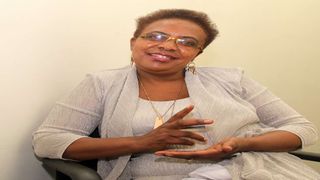
Dr Catherine Gachutha, a counselling psychologist and director of Kenya Institute of Business and Counselling Studies (KIBCo) during the interview at Nation Centre, Nairobi on January 31, 2021.
| Lucy Wanjiru | Nation Media GroupFamily
Premium
The ABC of an amicable divorce
What you need to know:
- Is it possible to have an amicable divorce?
- How do I start over after divorce?
Dr Catherine Gachutha is a counselling psychologist and director of Kenya Institute of Business and Counselling Studies (KIBCo).
When you walk into Dr Gachutha’s office, you will find one or two empty seats, depending on whether she last saw an individual or a couple.
There is also always a box of tissues on the table.
It is from this office that Dr Gachutha, who transitioned from teaching to counselling psychology, has practised for the past 20 years.
She tells us that she has counselled dozens of individuals who were fed up with their marriages, some going through the divorce process, others seeking help to overcome the trauma that is almost synonymous with the divorce process.
“I have seen individuals whose divorce processes have taken years to conclude and often, they are battered by storms which could arise from division of assets, settlements and child custody. My work, therefore, is to help people discover themselves and heal their psychological trauma because I am motivated to witness people, marriages and family wellness through psychotherapy, training and mentorship,” she says.
Besides those in the process of annulling their marriages, there are those who come to see Dr Gachutha because they are confused.
Do I leave or not?
They ask, “Do I leave or not?”
It is one of the most recurring questions she is asked.
“I know that I am not the authority to tell the person to leave or not because life is a maze. It has a lot of dynamics. Where I get such a question, I take my client through the process of analysing the matter because I want both of us to understand why he or she wants to leave and what that will mean. This is because, sometimes, people think that whatever they are going through cannot be amended. After evaluation and assessment, they themselves can determine whether they still want to leave or not,” she says.
Against the backdrop of divorce cases being on the rise in Kenya, Dr Gachutha discusses the emotional and psychological aspects of the divorce process.
Is it possible to have an amicable divorce?
It is possible to have an amicable divorce but this comes from the decision that we would want to be objective and make sure that we are going to handle this issue for the benefit of ourselves and the children, who bear the brunt of a dissolved marriage.
They are victims of such situations because they are not able to see what the future will look like. They drink deep from the cup of uncertainty and they may be anxious, confused and may start reading meaningless in life. They may also end up not believing in marriage.
Starting over after divorce
We listen to many children in therapy who say that they wouldn’t want to have children because they don’t want them to go through what they themselves experienced.
As such, the parties involved can decide to engage emotional intelligence and look beyond their differences. Eventually, such people are able to move on after the divorce and be productive.
How do you take care of your emotional psychological health?
We cannot afford to compromise our psychological and emotional health because when that is compromised, it affects all other aspects of life. When one gets into that process, they need to ensure that they will be dealing with emotions as they come.
I advise people to keep journals and write down the emotions enwrapped with the divorce and deal with them. Above all, this has to be a routine. When you feel like you are tipping over, you need to see a psychologist or therapist as your sounding board.
How do I start over after divorce?
You start by giving yourself time to heal from the broken relationship. Divorce is stressful. It also destabilises. Giving yourself time helps a lot because you get to deal with the grief and thoroughly explore yourself and learn to enjoy being your own companion.
Custody issues
That way, when you get a companion, you will get one to do life with, not because you are desperate or feel incomplete.
How do parties in a divorce process avoid spoiling their children in the name of making it up to them?
You need to bring up the child in such a way that he or she aligned to the real world. In the real world, there are no bribes or cushions. It can be ugly. You need to help them deal with issues constructively without trying to overprotect them. By doing that, you will be robbing them of resilience. You need to meet them at the point of their needs, which is being strong emotionally and psychologically. You also need to help them believe in marriage and family. As a psychologist, I encourage parents to take their children to play therapy.
How does one deal with custody matters?
Custody issues are very challenging because even after the court has determined the matter, some parents may still be haggling over the children. The mature way to go about this is to rise above it.
Can you make sure that your former partner can still be in your child’s life? When you are partners, there is no romance involved but you need to be empathetic with each other because you hold important individuals between yourselves.
As such, you need to work on your own emotions, thoughts and conflictual feelings because in most cases, these are the obstacles to peaceful co-parenting.





